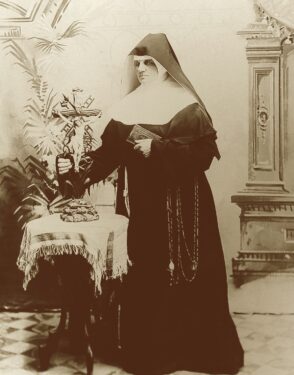
By OSV News
LOUISVILLE, Ky. (OSV News) — The cause for the canonization of a Belgian immigrant who experienced three apparitions of Mary in the Wisconsin wilderness in 1859 and dedicated her life to children’s catechesis will move forward, U.S. bishops determined June 14.
Green Bay Bishop David L. Ricken, who declared in 2010 that Adele Brise’s apparitions were worthy of belief, presented the proposal during a consultation at the U.S. Conference of Catholic Bishops’ Spring Plenary Assembly June 12-14 in Louisville. Brise’s apparitions are the only U.S. Marian apparitions declared “worthy of belief.”
“The virtuous life and sanctity of Adele still has relevance to people today, first of all her simple obedience,” Bishop Ricken said June 14. “Adele demonstrated heroic obedience to her family, to her parish priest, to the bishop, to Our Lady and ultimately to Our Lord and his will for her. Her obedience was often accomplished by great acts of faith.” Brise also exemplifies freedom from idleness and a model for catechesis and the new evangelization, Bishop Ricken said.
Before a cause is open, church law requires diocesan bishops to consult with the Christian faithful, the Holy See and other bishops. The June 14 vote, which passed with a unanimous voice vote, fulfills the latter condition.
Brise was 28 when the apparitions occurred some 18 miles northeast of Green Bay. The first took place while she was walking to a gristmill to grind grain. The last two took place a few days later while she was walking on the way to and from Sunday Mass.
Bishop Ricken felt compelled to explore the woman’s canonization after noticing visitors at the National Shrine of Our Lady of Champion, which honors Mary and commemorates the apparitions, praying at Brise’s grave, he told OSV News in May. He said the shrine’s visitors often ask if Brise’s cause for canonization is underway, noting that she has inspired their own faith.
According to historical accounts, the Blessed Mother was silent during Brise’s first two encounters with her, and Briese wondered if the woman dressed in dazzling white was a ghost. On the third encounter, after seeking advice from a priest, she fell to her knees and asked, “In God’s name, who are you, and what do you want of me?”
The lady identified herself as “the Queen of Heaven who prays for the conversion of sinners, and I wish you to do the same.” Her request for Brise was twofold: “Make a general confession and offer Communion for the conversion of sinners,” and “Gather the children in this wild country and teach them what they should know for salvation. Teach them their catechism, how to sign themselves with the Sign of the Cross and how to approach the sacraments.”
Brise did as she was instructed. As a girl still in Belgium, she had promised Mary that she would become a teaching religious sister, but she was unsure of how to fulfill that promise after she accompanied her family when they immigrated to America. After the apparitions, she traveled as far as 50 miles from her home to teach children, exchanging household chores for time to instruct them. Eventually, other women joined her, and the area’s Catholics built them a convent, school and larger chapel. An inscription seeking the intercession of Our Lady of Good Help was placed over the chapel door, and the eventual shrine was known as the Shrine of Our Lady of Good Help until it became the National Shrine of Our Lady of Champion in 2023.
Twelve years after the apparitions, the Great Peshtigo Fire — which still holds the record for the most devastating fire in U.S. history — broke out in northeastern Wisconsin Oct. 8, 1971, killing as many as 2,400 people and burning 1.2 million acres. The people near Champion fled to the chapel of Our Lady of Good Help where Brise and her companions were praying. They prayed all night, lifting a statue of Mary in the opposite direction of the smoke and flames. Eventually rain came, extinguishing the fire.
The convent, school, chapel and their surrounding five-acre grounds, which were consecrated to Mary, were saved, but everything else for miles around them had been destroyed, with char on the outside of the property’s fence. A local priest wrote at the time that the shrine’s buildings “shone like an emerald isle in a sea of ashes.”
The fire anniversary draws thousands of Catholics for an all-night prayer vigil. The following day, Oct. 9, is the date historians believe marks Mary’s final apparition to Adele.
Brise and her companions continued to catechize, inspiring the faith of the area’s Catholics. She died July 5, 1896, and is buried near the shrine chapel.
According to Bishop Ricken, the National Shrine of Our Lady of Champion is serving as petitioner for Adele’s cause. A postulator, who has yet to be identified, also has been selected to work with the diocese and to assemble a formal petition.
“There are many steps along the path to canonization, and a diocesan investigation and Roman phase are needed before declaring her ‘venerable.’ There is no set timeline; it’s on God’s time,” Bishop Ricken told OSV News in May.
When a sainthood cause is officially opened, the candidate receives the title “Servant of God.”
The church’s process leading to canonization involves three major steps. First is the declaration of a person’s heroic virtues, after which the church gives him or her the title Venerable. Second is beatification, after which he or she is called “Blessed.” The third step is canonization, or declaration of sainthood. In general, two miracles need to be accepted by the church as having occurred through the intercession of the prospective saint, one for beatification and one for canonization.
According to the USCCB website, there are currently 11 American canonized saints; another four persons are beatified, while 13 have been given the title “Venerable.”
